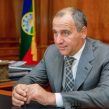
Karachaevo-Cherkessia Faces Economic Uncertainty
Publication: Eurasia Daily Monitor Volume: 13 Issue: 18
By:

On January 19, President Vladimir Putin met with the governor of Karachaevo-Cherkessia, Rashid Temrezov, in Moscow. Temrezov reported that the republic reduced its dependence on the Russian federal budget in 2015, and that tax collection rates and the republican economy overall were better last year than in 2014 and 2013. New businesses and enterprises are opening in Karachaevo-Cherkessia, he said, while investors are proceeding with their investment plans in the republic (Kremlin, January 19).
Karachaevo-Cherkessia’s governor sounded particularly upbeat about the situation in his republic because his first term ends in March and he has set out to prove that he is in charge of the situation. In reality, however, 2015 turned out to be quite tumultuous for the authorities in Karachaevo-Cherkessia. Ethnic groups in the republic became much more politically active compared to previous years. The Cherkess (Circassians), Abaza, and even the normally complacent ethnic Russians criticized the republican authorities for the continuing deterioration of the economy and lack of governmental transparency. Even the dominant ethnic group in the republic, the Karachays, rallied against the republican governor. In December, the usually calm republic saw a special counter-insurgency operation in which three suspected militants were killed (Politika09.com, January 4).
Against the backdrop of Russia’s deteriorating economic situation, the political forces in the republic started organizing a challenge to Temrezov’s leadership, with the two competing Circassian clans, the Derevs and Arashukovs, reportedly making peace. The opposition among the Karachays was also solidified (Politika09.com, January 11), reportedly led by the individuals who are close to former republican president Mustafa Batdyev.
Karachaevo-Cherkessia has not always been relatively stable compared to its neighbors in the North Caucasus, and, in fact, was known for extremely volatile events unique to this multiethnic republic. For example, during the 1999 regional presidential elections, supporters of the Karachay candidate, Vladimir Semyonov, clashed with supporters of the Circassian candidate, Vladislav Derev, over the results, nearly sending the republic into a downward spiral of violence. Semyonov rejected calls by Moscow to step down to calm the situation and the Circassians threatened to secede from Karachaevo-Cherkessia and form their own autonomous region within the Russian Federation. Semyonov ultimately won the standoff and ruled the republic for one presidential term.
Another unprecedented event took place in the republic in the fall of 2004, when the son-in-law of Mustafa Batdyev, who was then Karachaevo-Cherkessia’s president, and his associates killed and burned several prominent local businessmen. Relatives of the victims staged a protest in the republican capital Cherkessk, and in response to the government’s inaction and attempts to cover up the crime, stormed the government building, forcing Mustafa Batdyev to flee. The protesters occupied republican government buildings and demanded a fair investigation and Batdyev’s resignation.
Thus, seemingly quiet Karachaevo-Cherkessia has an extremely volatile recent history. Some of the republic’s large enterprises, such as the Kavkaztsement cement producing plant, have announced large layoffs (Politika09.com, January 13). Under pressure from Moscow, the republican government reduced its budget, which, even though it may have pleased the Russian government, further exacerbated the situation in the republic. Moscow then decided to come to the rescue of Karachaevo-Cherkessia’s government by using Russian oligarchs. The Russian Joint-Stock Financial Corporation Sistema bought Yuzhny, the largest closed ground agricultural business in Russia, which is located in Karachaevo-Cherkessia. The business was initially valued at nearly $100 million, but may have been sold for a much lower price. The enterprise will also reregister itself in Karachaevo-Cherkessia instead of Moscow and pay taxes locally, which is likely to provide a hefty boost to the republican budget. Vladimir Yevtushenkov’s Sistema reportedly has gone on a spree of acquiring agricultural enterprises in southern Russia, apparently taking advantage of the dire condition many of these enterprises are in (Kavkazskaya Politika, January 21).
Large acquisitions in Russia, especially if they are taking place in the North Caucasus, are almost always approved or directed by the Russian political establishment. Given the current economic downturn, Moscow’s coffers are quickly drying up, due to the low energy prices, economic sanctions and absence of economic reforms. The Russian government’s strategy of providing funds to the republican governors in the North Caucasus and receiving their loyalty in return also appears to be changing. Under the new crisis conditions, the money of Russian oligarchs is one of the sources the Russian government is counting on to ensure that the North Caucasus remains financially dependent on Moscow. However, it is unclear whether, given the current economic downturn, the Russian oligarchs will be able to invest any substantial amounts of resources in the North Caucasus to keep the local elites loyal to the Russian government.




